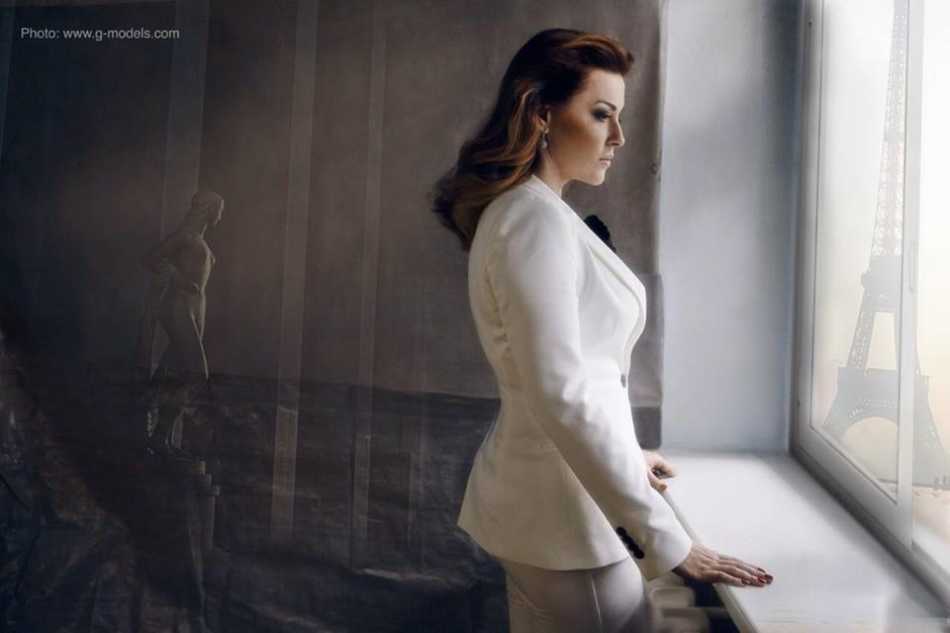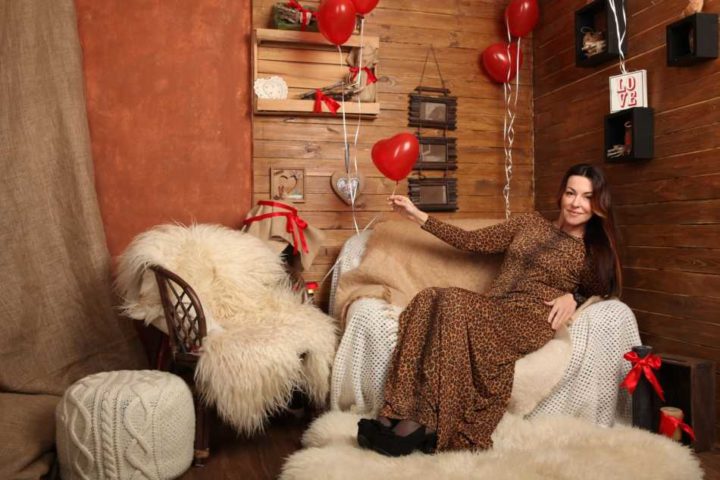“You have a best friend. It's you yourself"

This kind of relationship is worth waiting for.
25.02.2017
What will you “wear” your slimness with?
07.08.2017Today there is a lot of talk about accepting yourself for who you are. Some people cope with this easily, others fail at all - how can you love your weaknesses and shortcomings? Acceptance does not mean approval, explains psychotherapist Svetlana Krivtsova. The main thing is that you have someone who is always on your side. You yourself.

Psychologies: Many of us were taught as children that we should be critical of ourselves. And now they talk more about acceptance, that you need to be kinder to yourself. Does this mean that we should be lenient towards our shortcomings and even vices?
Svetlana Krivtsova: Acceptance is not at all synonymous with condescension or approval. “Accepting something” means that I allow this something to take a place in my life, I give it the right to be. I say calmly: “Yes, it is what it is.” Some things are easy to accept: this is a table, we sit at it and talk. I'm in no danger here. It's hard to accept what I perceive as a threat. For example, I find out that my house is going to be demolished.
Is it possible to be calm when our house is being demolished?
To make this possible, internal work will have to be done. First of all, force yourself to stop when you want to flee or respond to a threat with aggression. Stop and gather the courage to start figuring it out.
The deeper we study a question, the sooner we come to clarity: what do I actually see? And then we can accept what we see. Sometimes - with sadness, but without hatred and fear. And even if we decide to fight for our home, we will do it wisely and calmly. Then we will have enough strength and our heads will be clear.
Then we respond not with a reaction similar to the reaction of flight or aggression in animals, but with a human act. I can be responsible for my actions. This is how inner balance comes, based on understanding, and calmness in the face of what he sees: “I can be close to this, it does not destroy me.”
What do I do if I just can’t accept something?
Then I run away from reality. One of the options for escape is a distortion of perception, when we call black white or point-blank we do not see some things. This is an unconscious repression that Freud spoke about.
What we have repressed turns into energetically charged black holes in our reality, and their energy constantly keeps us on edge. We remember that there is something that we have repressed, although we do not remember what it was. You can’t go there and under no circumstances should you let it out. All efforts are spent not looking into this hole, avoiding it. This is the structure of all our fears and anxieties.

And to accept yourself, you need to look into this black hole?
Yes. Instead of closing our eyes, we, through an effort of will, turn ourselves towards what we don’t like, what is difficult to accept, and look: how does it work? What is it that we are so afraid of? Maybe it's not so scary? After all, the most frightening thing is the unknown, cloudy, unclear phenomena, what is difficult to grasp.
Everything we just said about the outside world also applies in our relationships with ourselves. The path to self-acceptance lies through understanding the vague sides of your personality. If I have clarified something, I stop being afraid of it. I understand how this can be dealt with.
Accepting yourself means taking an interest in yourself again and again without horror. The 19th century Danish philosopher Søren Kierkegaard spoke about this: “No war requires the kind of courage that looking into oneself requires.” The result of the effort will be a more or less realistic picture of yourself.
But there are those who manage to feel good about themselves without making any effort. What do they have that others don't?
Such people were very lucky: in childhood they were surrounded by adults who accepted them, not “in parts,” but entirely. Please note that I am not saying that they unconditionally loved him, much less praised him. The latter is generally a dangerous thing. No. It’s just that adults did not react with fear or hatred to any properties of their character or behavior; they tried to understand what meaning they had for the child.
For a child to learn to accept himself, he needs a calm adult nearby. Who, having learned about the fight, does not rush to scold or shame, but says: “Well, yes, Petya didn’t give you the eraser. And you? You asked Petya properly. Yes. What about Petya? Ran away? He cried? So what do you think about this situation? Well, okay, what are you going to do?”
Some people can't stand criticism because their parents were afraid they wouldn't be proud of their child.
We need an accepting adult who listens calmly, asks clarifying questions so that the picture becomes clearer, and is interested in the child’s feelings: “How are you? What do you think, to be honest? Did you do it well or badly? Children are not afraid of what their parents look at with calm interest.
And if today I do not want to admit some weaknesses in myself, there is a high probability that I learned the fear of them from my parents: some of us cannot stand criticism, because our parents were afraid that they would not be able to be proud of their child.
Suppose we decide to look into ourselves. And we didn’t like what we saw. How to deal with this?
To do this, we need courage and... a good relationship with ourselves. Think about it: each of us has at least one true friend. Relatives and friends - anything can happen in life - will leave me. Some will leave for another world, others will be carried away by their children and grandchildren. They could betray me, they could divorce me. I can't control others.
But there is someone who won't leave me. And that's me. I am that same comrade, an internal interlocutor who will say: “Stop working, your head is already starting to hurt.” I am the one who is always for me, who tries to understand. Who doesn’t finish in a moment of failure, but says: “Yes, you messed up, my friend. I have to fix it, otherwise who will I be?” This is not criticism, this is support from someone who wants me to feel good in the end. And then I feel warmth inside: in my chest, in my stomach...
That is, we can feel acceptance of ourselves even physically?
Certainly. When I approach something valuable to myself with an open heart, my heart “warms” and I feel the flow of life. In psychoanalysis it was called libido - the energy of life, and in existential analysis - vitality. Its symbol is blood and lymph. They flow faster when I am young and happy or sad, and slower when I am indifferent or “frozen.” Therefore, when a person likes something, his cheeks turn pink, his eyes sparkle, and his metabolic processes accelerate. He then has a good relationship with life and himself.

What can prevent you from accepting yourself? The first thing that comes to mind is endless comparisons with more beautiful, smart, successful...
Comparison is completely harmless as long as we perceive others as a mirror. We can learn a lot about ourselves by how we react to others. This is what is important - to know yourself, to appreciate your own uniqueness. And here memories can intervene again. It’s as if the themes of being different from others in us sound like music. For some, the music is disturbing and bitter, for others it is beautiful and harmonious.
The music was set by the parents. Sometimes a person, having already become an adult, tries for many years to “change the record.” This theme is clearly evident in the response to criticism. Someone too readily admits his guilt, without even having time to figure out whether he had a chance to do better. Some people cannot stand criticism at all and begin to hate those who encroach on their impeccability.
This is a painful topic. And it will remain like this forever, but we can get used to dealing with such situations. Or even in the end we will come to a trusting attitude towards critics: “Wow, how interesting he perceives me. I’ll definitely think about it, thank you for your attention.”
A grateful attitude towards critics is the most important indicator of self-acceptance. This does not mean that I agree with their assessment, of course.
But sometimes we really do bad, and our conscience torments us.
With a good relationship with ourselves, conscience is our helper and friend. She has a unique vigilance, but does not have her own will. It shows what we would need to do to remain ourselves, the best us that we want to know ourselves to be.
The feeling that life has meaning depends not on what we do, but on how we do it
And when we behave wrongly, it hurts and torments us, but nothing more... We can brush aside this torment. Conscience, in principle, cannot force you to do something, it only quietly suggests. What exactly? Become yourself again. We should be grateful to her for this.
If I know myself and trust this knowledge, I am not bored with myself, and I listen to my conscience - do I truly accept myself?
For self-acceptance, it is essential to understand where I am now, in what place in my life. In what direction am I building it? We need to see the whole, we, as it were, “sketch” the whole for today, and then it acquires meaning. Now many clients come to psychotherapists with this request: “I am successful, I can pursue a career further, but I don’t see the point.” Or: “Everything is fine in the family, but...”
So you need a global goal?
Not necessarily global. Any goal that aligns with our values. And anything can be valuable: relationships, children, grandchildren. Some people want to write a book, others want to grow a garden. Purpose acts as a vector that structures life. The feeling that life has meaning depends not on what we do, but on how we do it. When we have something that we like and to which we internally agree, we are calm, satisfied, and everyone around us is calm and satisfied.
It is probably impossible to accept yourself once and for all. Surely we will still sometimes fall out of this state?
Then you will have to return to yourself again. In each of us, behind the superficial and everyday - style, manner, habits, character - there is something amazing: the uniqueness of my presence on this earth, my incomparable individuality. And it’s true: there has never been anyone like me before and there never will be again.
If we look at ourselves this way, how do we feel? Surprise, it looks like a miracle. And responsibility - because there is a lot of good in me, can it manifest itself in one human life? Am I doing everything for this? And curiosity, because this part of me is not frozen, it changes, it surprises me with something every day.
If I look at myself this way and treat myself this way, I will never be alone. There are always other people around those who treat themselves well. Because the way we treat ourselves is visible to others. And they want to be close to us.
Author Svetlana Krivtsova



